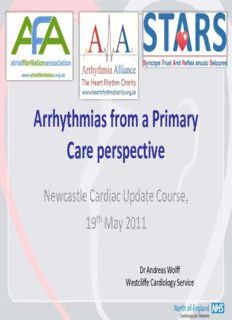
Arrhythmias from a Primary Care perspective PDF
Preview Arrhythmias from a Primary Care perspective
Arrhythmias from a Primary Care perspective Newcastle Cardiac Update Course, 19th May 2011 Dr Andreas Wolff Westcliffe Cardiology Service Darlington cardiology service questionnaire • GPs were asked their preferences on a variety of potential cardiology service developments • High completion rate 72% • Highest on the wish list: – Rapid access arrhythmia / AF service 88% – Rapid access syncope service 60% 5% of presenting complaints potentially have an arrhythmic cause • Palpitations • Blackouts • Dizziness • Fatigue • Breathlessness • Chest discomfort The role of General Practice in arrhythmia care • Assessment of initial presentation • Triage and signposting • Diagnostics • Management of appropriate conditions • Screening • Patient and carer support Palpitations: why not just refer them all ? • Common presentation • Majority do not have a significant arrhythmia • Assessment is simple • No fancy tests required • Common reason for cardiology referral • Prioritisation Waste of resources and cause of unnecessary anxiety Palpitations •Have you taken a good history? •Any associated symptoms? •Any structural heart disease? •Any family history? •Any contributing factors? Investigations •FBC •U/Es •TFTs Risk stratification •Skipped beats •Hx suggests •Palpitation during •Thumping recurrent exercise beats tachyarrhythmia •Palpitations with •Short •Palpitations with syncope / near fluttering associated symptoms syncope •Slow AND / OR •High risk structural pounding •Abnormal ECG heart disease AND AND / OR •FHx of inheritable •Normal ECG •Structural heart heart disease / SADS AND disease •High degree AV •No FHx block AND •No structural heart disease Refer to cardiology Low risk Refer to cardiology / with Manage in Arrhythmia care urgency Primary Care Co-ordinator Wolff A., Cowan C. Brit J Cardiol 2009;16
Description: